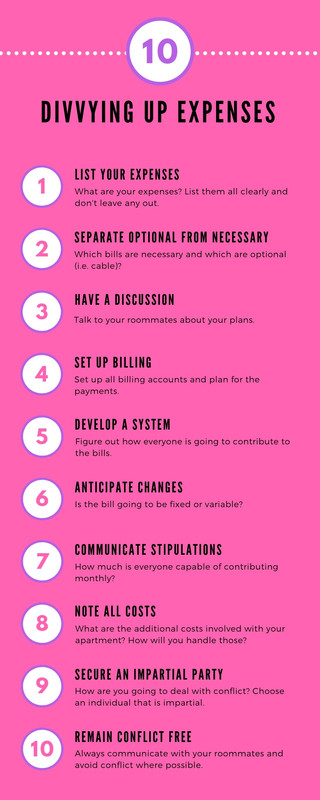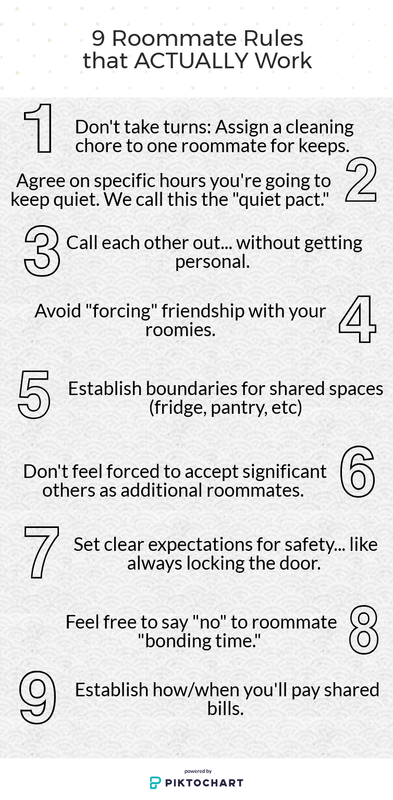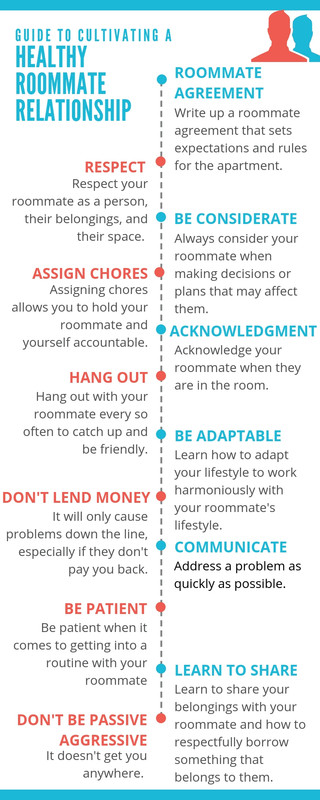College Roommate Tips
15 Holiday Gift Ideas for Your Roommate
In your undergraduate years at college, care packages, gifts and financial assistance from family and people alike are frequent luxuries you cherish with all your heart. Family and friends want to do everything they can to make sure you have the smoothest college experience possible and it usually works out that way! Sometimes, however, gift giving can be difficult and with all of the options out there, it can be nearly impossible to figure out what is the perfect gift for someone.
Holiday shopping as a college student isn’t necessarily easy because well, a lot of us are broke. Between tuition payments, student loans, and other expenses, many of us don’t have a lot of extra money to spend. Additionally, as a roommate, you live and share just about all aspects of your life with your other roommate, knowing them inside and out. Despite this, knowing just the right present to gift them during the holiday season can be difficult. You may ask yourself questions like, “Do they really need this?”, or “What if they already have something like this?” If you find yourself asking these questions, you’re not alone! Are you currently sharing a dorm with someone? Are you freaking out over holiday shopping for them? Unsure of a great gift to give them? Check out these 15 present ideas to gift your roommate this season!

1. Gift Cards: While gift cards may seem like a thoughtless gift, they are very much appreciated by college students, especially roommates! Whether the gift cards are to restaurants, stores like Walmart or Target, or even for online companies like Amazon, they are definitely useful and can alleviate the stress of spending money on items that they would opt out of spending money on!
2. Coffee Press/Maker: College students run on coffee, I think we all can attest to this. Especially with the spring semester coming up and academics getting tougher, coffee is a necessity in order to function, so why not gift your roommate a coffee press or coffee maker! Perhaps their coffee maker is old and needs replacing or they just don’t have one, a coffee press/maker is a great gift for roommates. They’re inexpensive, useful and last awhile! Keurig is also a great option for a roommate that is always on the run and needs coffee quick! With all of the different varieties of coffee, you can put together a fun gift pack for your roommate to try!
3. Crockpot/Slow-Cooker: School tends to occupy most of our time which means that when it comes down to meals, we can get lazy about it. One of the greatest inventions of all time (besides sliced bread) is the crockpot. With the crockpot, you can prepare your meals hours in advance, put them in and cook them slowly for hours! The great thing about this? You can work or study all day and not have to worry about throwing a meal together when it’s dinner time! This can eliminate unhealthy substitutions for meals and make life so much easier for your roommate, making it an awesome and thoughtful gift for the holidays!
4. Motivational Supplies: College can be tough and sometimes we can get discouraged when things don’t turn out how we want them to. Sometimes, you just need a mood booster to help push you through that hard day/week/month! Motivational supplies like post-it notes, folders, notebooks, pencils, etc. are inexpensive ways to keep your roommate inspired and positive while in school. These supplies will always have nice messages like “Keep Calm and Carry On” or “I Can Do This”, things that your roommate made already know, but a visual aid always helps! Not only will this help your roommate in the long run, but it will also show them that you care about them!
5. Aromatherapy oils: Not everyone gets on board with using aromatherapy oils, but I promise you they work wonders! Once you’ve used them, you’ll be convinced that they are miraculous gifts sent from the sky. A few popular oils that are great for gifts are eucalyptus, lemon, tea tree, lavender, peppermint, and oregano. According to Dr. Axe of draxe.com, aromatherapy oils contain unique and therapeutic benefits, which include: improving respiratory issues (eucalyptus oil), helping with relaxation and healing cuts (lavender oil), cleaning items (lemon oil), helping kick a cold (oregano oil), supporting digestion and boosting energy (peppermint oil), and containing anti-bacterial qualities (tea tree oil). Convinced yet? You can purchase this nice gift set of these oils for less than $20 or get one or two to put in a stocking as a stocking stuffer for your roommate!
6. Microwavable Plush Warmer: Do you usually see your roommate slumped over their desk for hours on end? Do you hear them complain of neck and/or back pain as a result? One of the greatest gifts I’ve ever gotten was a microwavable plush warmer. It's like a stuffed animal that you can heat up to help with aching muscles and cramping! They come in a variety of animals from owls to elephants so you can find the perfect one for your roommate depending on what kind of animal they like! You can get them for less than $20 at select stores, making them a perfect and inexpensive gift for your roommate.
7. Toiletries: As an adult, sometimes the things we need are the most obvious necessities but they often slip our mind! Especially while we’re in school, things like projects, homework or exams occupy our mind which can distract us getting stuff we really need. Pick your roommate’s brain or if you’re really close with them, raid their bathroom caddy or dresser to see things that they may need more of! Items such as deodorant, shampoo/conditioner, toilet paper, soap, and socks are perfect gifts for any roommate because no matter what, I guarantee you they will always need these items and will be wishing they had them once they used them up, it’s just part of being an adult!
8. A Multi-functional jacket: Whether you are freezing in the middle of winter or are caught in the rain of spring, a jacket is always a necessity. A great gift for your roommate is a multi-functional jacket, one that can be used around all seasons. Qualities to look for include water resistant, lined with fleece or another warm material and hooded. An additional thing to consider when buying a jacket for your roommate is the sizing since you’ll want it to both fit well but also be large enough to layer clothes underneath! A jacket that can last through the seasons can make commuting to class a little less discouraging, which will make your roommate happier!

9. A watch: In class or at work, we can’t always check our phones to see what time it is. Maybe your roommate has a busy schedule or maybe they just need better time management, either way, a watch is a great gift for your roommate to help make their life easier. Either a digital or analog watch is always useful for your roommate and adults in general, and the best thing is, they’re inexpensive!
10. A New Backpack: So backpacks go through a lot over the years. Two years ago you may have spilled spaghetti on it and the stain never really came out, or you used it on a camping trip and the mud tracks have stuck to it like glue. Throughout the years, backpacks can get run down but no one really wants to fork out the money to get a new one, for one they’re kind of pricey and secondly, who really wants to go backpack shopping? A new backpack can be a perfect gift for your roommate because they’re useful and functional! Plus there are so many with different patterns and colors and ones with cool pockets for tablets and laptops, making them a thoughtful gift for your roommate!
11. Succulents: One way to help your roommate freshen up their dorm room is to put different kinds of plants throughout the dorm! Not only are plants a beautiful decorative piece, but they also give your place that fresh, spring vibe. According to Silvia C. of Daily Dream Décor, “[plants] help your home get more oxygen; they bring a happy mood into any space and help increase your work productivity.” Not only are succulents inexpensive, but they are also super easy to take care of, even if you do forget about them for awhile- making them a perfect gift!
12. A fun mug: This gift goes hand-in-hand with college students’ need for coffee. With so many of us running off of coffee every day, every hour, etc. sometimes you need more than one or two mugs to change up the game! One great gift to give your roommate for the holidays is a fun mug! There are so many options to out there, which can make shopping for your roommate a breeze! Pick up on some of the things they like, whether it's their favorite animal like a sloth or llama, their favorite show or movie, or favorite phrase and go to town! Places like Target, Walmart, or even Five Below have an awesome variety of options for holiday gift giving!
13. Personalized Picture Frame: To help remember the fun memories of you and your roommate together, gift them a personalized picture frame for the holidays! Places like the dollar tree have cute frames for only a dollar, which gives you more freedom to decorate it with jewels or stickers! Just get your favorite picture of the two of you, frame it, decorate the frame and you’re done! Not only is this gift inexpensive, but it also is a great way to show your roommate that you care.
14. Fuzzy Socks: Around this time of year, the temperature drops and the chilly weather can leave us feeling cold and depressed. I’m not saying that fuzzy socks can solve your roommate’s problems, but they can make them feel cozy and comfortable during these chillier months! Just about every store has fuzzy socks for an affordable price with a bunch of cool patterns, animals, and characters, making gift giving fun and stress-free.
16. Spa Day Essentials: Just about everyone needs a good spa day every once in a while (yes, guys included)! With the stresses of school, extracurriculars, work, and social life, sometimes you just need a day to unwind and relax. Spa day essentials are an awesome gift for your roommate, showing that you care about their well-being and want the best for them! Good spa day essentials include bath bombs, face masks, body scrubs and lotions, a fluffy robe, etc. Additionally, Target, in particular, has beauty boxes that have little samples of items related to the face and body, which would make a perfect gift for your roommate in need of a day off.
Some people truly don’t get excited to do yearly holiday shopping, whether its due to the fact that there’s a lot of money spending, or crazed people, or the overall stress of it. Having a good list of holiday gift ideas before you venture out into the world of shopping and holiday deals can make your life so much easier.
A lot of people think that the holiday season is all about the quantity of gifts that you give, but it's truly about the quality and the thought that goes into the gift you’re giving to your roommate. Just the smallest of gifts can completely change someone’s mood or their perspective on life! Perhaps the greatest piece of advice I can offer is to dig deep into your heart (and not your wallet) to give your roommate something you know they will love and appreciate. It’s not about how much money you spend, or the brand name of the item you get, or how much of something you get, but the thought and the intention behind the gift you’re giving.
If you aren’t sure and still completely stressed out about what to get, just go with something easy like a gift card! In the end, I hope these ideas will keep you stress-free during the holiday season and make gift shopping a breeze! As always, good luck!

Making the Most Out of Rooming with Strangers
Roommate horror stories are nowhere near rare when it comes to discussing different experiences. There are multiple themes when it comes to these horror stories: roommates leaving dirty socks everywhere, throwing surprise parties with no prior notice, the cat that seems feral but is actually your roommate's pet. Despite the cause of the "horror" aspect, many think that things between roommates go awry just because the roommates were strangers, to begin with. There is often a common thread of how living with a stranger can go wrong so easily - you barely know the person and you are suddenly living with them and expected to get along with them from the start.
However, do not think that living with a stranger is a guaranteed start to your very own roommate horror story. Living with a stranger does not have to be the worst living situation you can find yourself in - it can actually turn out to be the best living situation you could expect. If you find yourself having to live with a stranger due to unforeseen circumstances like a canceled lease or your original roommate leaving to study abroad, here is how you can make the most out of rooming with a stranger:

Get to know them
When you are rooming with a stranger, you are going to have to be comfortable enough with them to share a living space - something that is very personal for many. This does not mean you have to be best friends with your new roommate, but you do want to be comfortable enough to have that personal connection with them. When you first get your new roommate's contact information, try reaching out to them to get to know each other. This can be anywhere from giving a smaller and written self-introduction through email or a messenger app, to arranging to meet up before moving in together.
Getting to know each other prior to moving in is helpful because it will help you feel more comfortable when you are moving in. You won't have to feel anxious about how your first conversation will go on top of moving-in stress because the first conversation or two will already have gotten out of the way prior to moving in. When getting to know each other, you may also want to talk about each other's living habits. Some questions you may want to consider asking include:
- Are you a morning or night person?
- How social are you? Do you expect to have guests over frequently?
- How often do you clean, or what is your preferred level of cleanliness?
- What are some issues that you had with previous roommates?
Accept the opportunity for more personal time:
When you are rooming with a stranger, you are not necessarily expecting to become best friends with them. Meaning, you are not expected to spend every waking moment together. Yes, you may want to cook a meal or two together every so often or sit down to watch a few movies, but you aren't expected to do everything at home with them at your side.
If you are living with your close friends, it would be harder to say no to hanging out when you live together. Time to yourself to catch up on your favorite show with a pile of snacks at your side may turn into a full-blown friend hangout that you did not expect when your roommate catches the drift of your downtime. You may face a situation where your roommates get offended when you say no to hanging out, or you may even find yourself overworked when you start saying yes to hanging out instead of spending time getting rest or doing homework.
Rooming with a stranger creates its own boundary. You can still hang out with them when you would like to, but there shouldn't be an expectation to spend an excessive amount of time with them.
You get the opportunity to experience new things:
When living with a stranger, you get the opportunity to meet someone new - someone that you may not have met if not for the fact that you had to live with them. This can mean living with someone that is a different major than you, someone from a different upbringing, etc. Depending on how social you are, rooming with a stranger can be a very big opportunity to branch out of your small circle of tight-knit friends.
If you are used to hanging out a certain cultural group, you and your new roommate can share more about each other's cultures through new traditions and cooking each other meals. Or, if you and your friends have gotten so close because you have so many shared interests and hobbies, you may not have been branching out much further than what you are used to or past your own personal interests.
Rooming with a stranger doesn't mean you have to live out the entirety of your lease in discomfort - make the most out of rooming with a stranger by seeing it as an opportunity.
6 Things to Consider Sharing With Your Roommate
If you have a good relationship with your roommate, chances are that you two may end up sharing some things. And just from living in such close proximity to one another, it’s nearly inevitable that you both would share some things, sometimes without even realizing it.
But if you want to be a little more intentional about exactly what kinds of things you two should share, it may be a good idea to draw some boundaries and come up with a list of items that each of you would feel comfortable sharing with the other. Read on for some ideas on what to consider sharing with your roommate.

1. Cleaning supplies.
A few things you and your roommate can certainly share are cleaning supplies, which may include a small vacuum, disinfectant wipes, or a broom. A vacuum is definitely convenient to have in your room -- most likely you won’t need to use it at the same time as one another, and it will take up less space than having two vacuums in the same room.
A broom and dustpan are also good things to share, particularly if there are any hardwood floors where you’re living (perhaps the kitchen or common room area), so you can easily sweep up messes.
What’s more, disinfectant wipes -- or items like paper towels and cleaning fluid -- are easy to share as well. Simply buy in bulk and keep them somewhere in your room so that you and your roommate can easily access them.
2. A mini fridge.
Even if you and your roommate are both on the campus dining meal plan, you’re sure to want some extra snacks and drinks in your room just in case. That’s where a mini fridge really comes in handy -- but instead of having two different fridges taking up a lot of space, you can have one fridge that will be big enough to hold food for the two of you.
If you’re afraid of not being able to tell whose food is whose, create some boundaries. Perhaps the top shelf could be assigned to you and the bottom shelf for your roommate; create a system that works for the both of you!
3. A TV.
Maybe everybody these days just uses Netflix instead of watching on an actual television set, but sometimes a TV can be useful. If either you or your roommate has guests over and wants to watch a movie or show on a larger screen, or even if one of you just feels like flipping through good old cable channels, a TV comes in handy. And in most cases, there’s no need to clutter up your common living space with multiple TVs, so sharing one is certainly an efficient option.

4. Decorations.
Decorations are another great thing to share between you and your roommate. If you have decorations such as string lights, posters, or anything of that sort that occupies wall space, it might be a good idea to share some of those items and coordinate who gets to use which parts of the walls. Particularly if one or both of you wants to hang up string lights, it may be beneficial to have just one of you bring them, as the string of lights will probably be long enough to go around the perimeter of the whole room.
5. Cooking supplies.
If you live in a dorm with a kitchen or perhaps an on- or off-campus apartment, you and your roommate will both need cooking supplies. Instead of each of you spending a fortune on your own cooking equipment, why not coordinate what each of you can bring or go shopping for supplies together? Doing so will not only allow you to save on costs, but also on the amount of space your stuff will take up in the kitchen.
Sharing larger items, such as rice cookers, big pots and pans, toasters, and coffee makers, is pretty doable as long as you are both respectful of each other’s belongings. Even sharing smaller items such as utensils as well as plates, bowls, and cups is manageable if you are able to identify whose stuff is whose at the end of the year.
6. Textbooks.
Beyond the belongings in your room, something else you and your roommate might want to share is textbooks. If you happen to be taking some of the same classes, this is a great way to save money, especially because textbooks are often fairly expensive. As a result, sharing one (or several) and splitting the cost could potentially do wonders for your bank account. Whether the textbook is a physical or electronic copy, you and your roommate can work out a system as to who can use it when. If both of you are up to it, you can even become study buddies for a class and use the textbook at the same time.
When it comes to sharing things with your roommate, don’t sweat it. As long as the two of you are respectful of each other and can work out a system, you’re both good to go!
How to Divvy Up Expenses with Your Roommates
Living with roommates is no easy task. More often than not, arguments ensue, and in terms of the content of those arguments, you can bet finance is largely involved. Getting a group of individuals in one place to share expenses isn’t a walk in the park, but it doesn’t have to be too hard, either.
So what’s the best way to fairly divvy up your expenses amongst your roommates? While there are a lot of variables to consider here, these 10 tips for divvying up expenses is a great starting point to conflict resolution!

1. List Your Expenses
Obviously not the most challenging part of the process, listing out your expenses for the year is a great way to begin any financial conversation. Simply create a detailed list of each additional expense (not covered by your lease) that you and your roommates are responsible for.
This includes, but isn’t limited to: rent, water, gas, electric, cable, internet, parking and any other additional fees that may not be clearly defined by your lease. While most leasing companies will fairly split lease bills amongst roommates, others will not, so it’s always better to be safe than sorry.
In this way, simply developing a list of all expenses will ensure that everyone is on the same page and that all potential bills are included in your discussion.
2. Separate Optional from Necessary
Here is one of the more challenging aspects of splitting bills: which are necessary and which are not? Consider the bills that everyone will contribute to because everyone takes advantage of gas, water and electric. These are necessities.
Now consider the bills that aren’t necessary to living situations, but that are enjoyed by most, if not all: cable, internet, and parking.
A large part of roommate conflict comes from who should contribute to these bills and who is reaping the benefits of the optional bills without contributing. By separating the necessities from the optional bills, you can have this discussion with your roommates. Is everyone going to use the cable? If not, who will split that cost? And how do you proceed if someone that isn’t contributing uses that item?
Again, these are challenging conversations, but splitting your bills into optional versus necessary will help to get you started.
3. Have a Discussion
Perhaps one of the most important items on this list, it is absolutely essential to have an open and honest discussion with all of your roommates regarding finances. This not only includes the above point on necessary versus optional bills, but it also comes down to who can afford what and how to proceed in terms of divvying up bills.
Never assume that your roommates all have the same budget that you do because odds are, they don’t. Expenses look different for everyone, so never assume something that is affordable to you is affordable to another as well.
Conversations between you and your roommates surrounding finance will only serve you better in the long run, especially considering the conflict that typically surrounds finance.
4. Set Up Billing
Once you’ve had the necessary discussions, it’s important that the roommates all work together to set up billing information. More often than not, only one person’s information is necessary to receive bills, so you must decide who will be that person for each account.
Many roommates put one name on all bills and split them up amongst themselves, others work directly with the company in question to ensure that everyone’s name is on the bill to avoid problems down the road. Whichever path you and your roommates choose for splitting up your bills, ensure that everyone is on the same page before you move forward.
Also note that some payment methods, such as credit, can incur additional costs and fees that all roommates may not be willing to pay. Just be sure that whatever method you’ve chosen is one that everyone agrees upon and that everyone is comfortable with, especially considering these hidden or extra fees.
It’s very easy with bills to be the individual that’s left with the bulk of the cost, so don’t fall victim to that problem! Again, it’s all about communication and ensuring that all of the roommates are on the same page at all times.
5. Develop a System
As previously stated, it’s very important for you and your roommates to develop a system in which you pay your bills on time and fairly, which is easier said than done. While you may have covered the billing information, there is still the problem of ensuring that the bill is paid on time every month.
Personally, my roommates and I put one person’s name on all of the bills for automatic payments linked to their credit card. This way, we ensured there was never a late fee on our bills. From here, the individual stuck the bill in question to the fridge with a magnet and everyone gave her a check with their quarter of the bill paid so she could deposit that to her account.
For some, this is the easiest way to pay bills. For others, this will not work. Basically, you need to develop a system that will work for each roommate and that will ensure your bills are paid on time and split as discussed by everyone.
This is another important conversation to have amongst the group. How does everyone plan to pay their share? What’s the easiest way to achieve that? Do you foresee any problems with these methods of payment? So long as everyone is communicating their questions and concerns with one another, you will be able to develop a system of payment that works for everyone and that you can fall back on throughout the academic year.

6. Anticipate Changes
That all being said, you also have to brace yourself for changes. The truth of the matter is things change, whether you’re prepared for that change or not.
For instance, in the summer, you may be paying more money to cool your apartment down, while in the winter you could be paying significantly more to heat it. Just because your bills are one rate one month does not mean they will be the same rate the following month. You have to anticipate the fact that your bill may change monthly, and that those changes may be significant.
While you can anticipate a fluctuation in water, gas and electric bills, also prepare for changes in your cable and internet bills, as rates can change without notice. Be sure to set expectations with your roommates in the event that rates go up, as sometimes this can mean the difference between a bill being affordable and not.
Basically, if you prepare for these events in advance and set expectations as far as how much you can afford at most per month, you will be in a better position when these unexpected changes come around.
7. Communicate Stipulations
As mentioned above, it’s always a good idea to communicate stipulations to bills prior to involving yourself. For instance, as mentioned above, if something is going to be too expensive for you, it’s better to mention that ahead of time than it is to mention it when it’s too late.
For example, what does your monthly budget look like for these bills? Are there any ways to cut costs to ensure you don’t exceed that budget? A good example of this is with the heat. Perhaps you’re looking to cut down on your heating costs, but the best way to do that is likely to set your thermostat to a lower temperature. This is something that you and your roommates will need to agree upon ahead of time, but that’s entirely doable.
In addition, to decrease cable costs, you can limit the amount of channels you receive. Some individuals may be willing to contribute a little more monthly for extra channels, or perhaps even pay a little extra to ensure they have cable in their rooms as well as in the main living space. There are plenty of ways to split bills and cut costs, but it requires communication amongst all of the roommates as well as the setting of clear expectations.
Wherever you can work together to cut costs, you can set those expectations ahead of time to ensure that everyone is on the same page when it comes to the monthly bill budget.
8. Note All Costs
Again, it’s absolutely essential that you note all of the costs associated with your bills. Each roommate can only be on the same page if everyone is aware of what the costs are going to be.
For my roommates and I, the easiest way to do this was to keep track of past bills so we could anticipate the amount of money we needed to save for the next bill. While some fluctuated from month to month, the average was pretty similar, which allowed us to guess how much we needed to contribute to bills on a monthly basis.
Some individuals hang the prices of each bill on their fridge so everyone can pay attention while others simply communicate the costs to each other once a month when it comes time to physically pay their bills.
Whatever your style, be sure that everyone is on the same page and aware of the costs and you’ll be successful in terms of avoiding conflict related to finance.
9. Secure an Impartial Party
Something that most roommates don’t secure, but that it would be helpful to have just in case, is a secured, impartial party. This is typically a mutual friend that all roommates agree can be impartial and step in during the event of a conflict.
For instance, let’s say you and your roommates disagree on who owes what on a bill. If your other roommates are unable to help make a decision, an impartial party can come in, hear the story out and make a decision that is fair and correct.
While this isn’t always a possibility (as there are many instances in which an entirely impartial person can be secured), this is a good idea to have in your back pocket, just in case.
10. Remain Conflict-Free
Throughout these 10 points, one theme is common: remain conflict-free. Basically, the best way to ensure this is achieved is through communication. Roommates must all communicate with one another in order to set expectations and ensure bills are divvied up fairly.
Additionally, however, remaining conflict-free is about maintaining an even, understanding temper so that, when potential conflict does arise, it’s easy to navigate away from it and remain conflict-free.
For example, if you foresee a problem with a bill due to an error in communication, let your roommates know as soon as you catch this problem and work together to brainstorm a solution. Or let’s say you forgot to pay a bill that you were responsible for and now there is a late fee. Rather than asking everyone for additional money, communicate the error and come up with a solution that everyone feels is accurate and fair.
There are plenty of ways in which a conflict can arise, especially when living in close proximity to one another and involving finance, an already touchy subject. Just be sure to work with one another and communicate as often as possible and you’ll be just fine!
Again, it’s hard enough living with other people, but conflicts involving expenses complicate this situation even further. So stop spending so much time worried about finances, divvy everything up fairly to avoid future conflicts, and enjoy the situation you’re in.
These 10 tips will help to get you started, but have a conversation with your roommates to ensure everyone is on the same page prior to divvying up expenses. Not only will this help put all conflict at ease, but it will also ensure you and your roommates are in a good financial position throughout the duration of your lease.

10 Ways to Bond With Your Roommate
For many students, going to college is the first time they have to share a room together, whether it is a dorm room or an apartment. Even if you have shared a room with a sibling, sharing a room with someone you just met can seem daunting at first. There are horror stories from students about terrible or weird roommates, and many fear that these will be true for them. However, even if you do not instantly hit it off with your roommate, there are ways for you to bond so that you can get to know each other and bond. Even if you end up not liking each other, you have to live together for the time being, so spending some time together to be on the same page is crucial to making it through. Here are a few ideas for ways to spend some quality time together while learning more about each other’s likes and interests.

Attend your campus’ club and organization fair
Many college campuses have a club and organization fair that showcases the school’s various ways to get involved on campus. Attend the fair with your roommate to allow yourselves to see what the other likes. If you find something that you are both interested in, sign up for the organization together as a way to spend more time together. If you decide to join different clubs or organizations, finding out what each of you is interested in is a way to get to know each other. Make it a point to attend one meeting or event of each other’s club if you join different organizations and support fundraisers the club is putting on to show your roommate that you care. Find out how to start your own campus organization if you are both interested in a club or organization that your campus does not offer. This process in itself will be a great way to figure out how your roommate works and will bring you closer together.
Designate one evening a week to do something special
Designate one night a week to do something special together. Make it consistently the same evening each week and honor this time commitment by not scheduling anything else during this time unless it is absolutely necessary and cannot be avoided. Having one night that is designated for spending time together gives you an opportunity to try new things together, which can help bring you closer together. It also gives you a chance to find out what your roommate likes and allows you to see what you have in common. If you like different things, it gives you a chance to experience something your roommate likes, which is a great way to show your roommate that you care and are willing to do something that you may not have done if not for them. Plan activities ahead of time so that you are sure you are committed and that you have something to look forward to.
Have a night in and order pizza or take out. Have a game night where you bring out your competitive sides. Pamper yourselves with a spa night complete with facials, nail painting, and relaxing music. Binge watch a TV show that neither of you has seen or watch each other’s favorite movie. Have a conversation about the show or movie. This will give you a chance to learn how your roommate perceives movies and will give you a new perspective of a movie you may have seen a million and one times before. Throw a party and invite your friends or floormates. This will give you a chance to meet each other’s friends and will allow you to get to know others on your floor, which is also important.
Get out of your dorm or apartment. Explore your college town by finding a locally-owned restaurant or store. Go to a concert or other cultural event. Going to a concert or play on campus is a great way to support your fellow students while spending time with your roommate. If you go to an event in your college town, make a night of it and grab dinner beforehand. Go to a sporting event. Cheer on your school’s team together or go to a professional sporting event where you are cheering for each of the teams from you and your roommate’s hometowns. Volunteering is a great way to make a difference while learning what kinds of causes your roommate cares about. A night out on the town will give you a break from the stress of college life and gives you a chance to expand your horizons.
Take a class
Taking a step out of your comfort zone to learn something new is more fun when you do it with someone, and who better to do it with than with your roommate. Whether you arrange your schedules to take a GenEd or elective class together, go to a local library to take a language class or take a fitness class together at your campus gym, learning something new together will help you bond with your roommate and will help you find a common bond, especially if you both love or hate the topic of the class. You will learn more about each other’s likes and skills as well as your own. You will also expand your horizons by learning more about the world around you. Getting out to learn something unexpected can lead you to new and beautiful things, so overcome your fear and sign up. If you do end up taking a college class together, make sure your roommate attends class and does not solely rely on you to cover and take notes if they routinely miss class.
Make playlists of your favorite songs to play for each other
Music has the power to help bring people together and a person’s choice of music can say so much about who that person is. Make a playlist of your favorite top 10 favorite songs and/or artists and have your roommate do the same. Play the playlists for each other. You may find that you have a common interest in one particular style or band. This can help fuel conversations. If you each have music that is important to your culture or religion and you include these songs, it is a great opportunity to teach your roommate something about you and to learn something from your roommate. Listening to each other’s playlist may introduce you to new music you love and will open up new doors and other friendships for you. Have a conversation with your roommate about why you each picked the songs you did and what each song means to you.

Create a bucket list for the school year
Make a list of things you want to do together this semester or year. It can be as simple as going to that hip restaurant off campus or getting better grades. You can also aim to join a new organization and do it together so that you do not feel as anxious about doing something new. Having similar goals and a common drive to accomplish them will bring you and your roommate together in ways nothing else can.
Also, create separate lists and hold each other accountable, as you are more likely to succeed if you tell others what you hope to achieve. Be a part of each other’s bucket list, even if you choose not to create a joint list. Hang the lists in a public place and have a place to publicly and visually track your progress. Create a schedule to help you stay on track with your bucket list. Help each other stay on track with your schedule and encourage each other when things get tough.
Study together
They say misery likes company, and this is especially true when you are working on schoolwork. Studying together may not seem like a big deal, especially if you are working on separate subjects or assignments, but it can really bring you and your roommate together. Just doing a common activity and holding each other accountable to stay focused is crucial. If you are working on separate assignments and one of you runs into an issue that the other is good at, you can help each other out. This helps you learn each other’s skills and shows you the other’s strengths and weaknesses. You can look over each other’s work once you are done and proofread each other’s papers. When you are working alone, it can be tempting to keep working when you need a break or get distracted when you need to focus. Studying with your roommate helps you stay focus but also helps you know when you need to take a break.
![]()
Follow each other on social media
Some people are more outgoing on social media. You may find out more about your roommate than you do in person. You can follow their social media pages to learn about what they like and who they are. If you find something about a recent trip they went on or a concert they went to, ask them about it. You may also see that you have mutual friends, depending on where you both grew up. Ask them about how they know people you know. Finding information, such as likes and mutual friends, through social media helps you find common ground with your roommate and gives you interesting talking points for great conversations.
Decorate your room together
You will be living with your roommate for at least a semester, so what better way to bond than to decorate your dorm or apartment together. Even if you have totally different tastes in style, you may be able to combine these styles into one cool look or have separate spaces for each of your styles, depending on how much room you have. Having clashing styles is easier in an apartment since you will likely have separate bedrooms, but you will have to compromise on common areas. Decorating your room together is a great way to bond as you will learn about each other’s design style as well as decorating talents. You will learn about each other’s favorite colors and personal style. A person’s interior design style can say a lot about who they are and how organized they are, which is crucial for a roommate. You can even go shopping together for anything you were unable to bring with you to the dorm or apartment.
Communicate with each other
Communication is absolutely key to any relationship, but it is even more important if you have someone you are living with. If you cannot hold a conversation because you do not get along, you need to figure out a way to put your differences aside so you can at least make it through the semester. Talking gives you an opportunity to update each other on what is going on in your lives and to coordinate schedules for things that are happening. This is especially important if your roommate will be out late one night. Exchange cell phone numbers and text each other throughout the day. You do not have to talk every second of the day, but being able to contact each other about specific issues is important in emergencies. Know each other’s schedules so you know the best time to chat. Have a conversation right before bed so that you
Create a roommate agreement
If you are a Big Bang Theory fan, you will know that Sheldon has a huge obsession with his roommate agreements and is a strict stickler for each individual rule that they contain. You also know that his roommate agreements are super long and in-depth. You do not have to go as in-depth with your agreement, though. While it is important to bond with your roommate and be friends, having a roommate agreement will help you set boundaries and delegate chores such as cleaning and doing dishes. Have a section about what to do if you and your roommate get into an argument and set boundaries for things such as sharing clothes and personal items. Set up a cooking schedule and have a place in your agreement for paying rent and other essential bills. Your agreement should also include a section on bringing significant others into the dorm or apartment and have contact information of a neutral person you should get in touch with in case of an argument about a policy. Have this person witness you and your roommate signing the agreement.
At first, you may be nervous to meet your new roommate, but if you give it some time and effort, you and your roommate may become close friends. There is a chance that you will not get along, but give it a chance and put in the work to at least get through the semester together.

How to Live with a Roommate Who is the Opposite of You
Living with roommates can be an intimidating experience, but it can be more intimidating if you and your roommate are very different. How can you reconcile two different lifestyles to create a peaceful and happy living situation? In this article, we’ll discuss how to live with a roommate who is the opposite of you.
Communicate your expectations
When living with a roommate who is the complete opposite of you, it is extremely important to communicate your expectations. It is likely that you will have different expectations for your living situations than your roommate has. Still, that doesn’t mean you are bound to have a difficult living situation! You just have to be aware of each other’s expectations and come up with a compromise so that both of your needs are met.
For example, you might expect to clean the kitchen after every meal, while your roommate expects to do all the cleaning at the end of the day. These are both good ideas, but you two will have to come up with a compromise so that neither of you feels frustrated. Preferably, before you move in together, have a discussion about your expectations for things like cleanliness of the bathroom and kitchen, guests (especially overnight guests), how you will split the rent, eating each other’s food, and borrowing each other’s things. If you and your roommate discuss your expectations about these things, there will be fewer surprises when you move in together because you’ll have a better idea of what you are getting yourself into.
Address issues right away, and in person
Unfortunately, when people live together, issues could arise. If you are a non-confrontational person, it might be easier to “sweep it under the rug” if an issue comes up. But if you ignore an issue for long enough, you risk becoming angry and resentful toward your roommate, who might not even be aware they’ve done something to bother you. Instead, when an issue comes up, talk about it in person, not via text (which can very easily be misinterpreted and cause even more issues). Choose a time when you are both in a good mood and without distractions. Of course, be respectful to them, too. If you do this, and your roommate is a decent person, they will likely try to change their behavior and resolve the issue. Even though it might be uncomfortable, talking to your roommate about any issues increases the chance that the issue will be resolved.
Respect their wishes
On the flip side of the coin, your roommate might have an issue with your behavior. If this is the case, don’t get defensive right away (as that’s usually our first instinct when we are called out). Listen to what your roommate is saying, and honestly consider if they are right. If they are, then respect their wishes and adjust your behavior accordingly. For example, if your roommate complains that you are too noisy, try to talk more quietly and turn down the volume of your music or TV. If your guests have been over-staying their welcome, make sure they don’t do it again. Living with another person involves working together, and that means to respect your roommate’s wishes.
Be understanding and patient with each other
When you live with someone very different than you, you will need to be understanding and patient with each other. For example, you can ask your roommate to be quieter, but you can’t change their night-owl tendencies. In this case, you will just need to be understanding and patient with your roommate. Other times, they might forget to do a chore they said they would do. In this case, be patient with them. You don’t know if they forgot because they were busy working! In short, be patient with your roommate, because one day, you will need them to be patient with you!
Extend common courtesy
This should go without saying, but please extend common courtesy to your roommate. Clean up after yourself, especially in the common areas, bathroom, and kitchen. Keep your things in your room, don’t leave them lying around in the common area. Don’t make too much noise. Always say “please” and “thank you,” ask before you borrow something (and give it back), and don’t eat their food (unless they specifically gave you permission to). Give them space if they want it. Extending common courtesy will make your roommate relationship much more comfortable.
Respect each other
Lastly, roommates need to respect each other. Yes, you two might have different sleep schedules and cleanliness preferences, but as long as you respect each other, you should have a good experience living together.
It’s not easy living with someone who is the opposite of you, but if you respect each other and communicate your expectations, you can still have a great living situation.
10 Fun Roommate Dates for Fall
During this time in the semester, we all are busy studying for midterms, finalizing rough drafts on papers and balancing upcoming deadlines. All of this can make us stressed out and leave us with no time to enjoy the fall season and catch up on some quality time with our roommates.
Although this time of year is busy, there are so many ways to hang out with roommates, celebrate fall, and not fall behind on your school responsibilities. Check out these 10 roommate dates for the fall -- P.S. you get bonus points if you do all of them!

1. Make Haunted Gingerbread Houses: Who said that making gingerbread houses was exclusively for Christmas time? You can actually have so much fun during the fall season by creating your own spooky haunted house with your roommates! Some stores like Target already have pre-made kits to make life easier, but you can get creative and use just about any decoration you want, like edible glitter or multi-colored icing, just have fun with it!
2. Visit Haunted Houses: One of the greatest parts of the fall season is Halloween. Candy, costumes, scary movies -- what’s not to love? Gather up your roommates one weekend and take a trip to a haunted house attraction in your area! Typically, there are multiple little attractions in the same location, like a haunted hayride, corn maze, etc. This is such a fun way to have fun and celebrate the spooky season with friends!
3. Host a Halloween Party: A small Halloween party is a super fun way to meet up with roommates and catch up with them! To host a small party in your dorm or apartment, start by decorating with some inexpensive pumpkins, cotton cobwebs, and glow in the dark lights to give it that spooky feeling. Then find some fun, Halloween-themed snacks to make for your friends, like Hot Dog Mummies, Halloween Harvest Mix and Vampire Teeth Cookies! Lastly, find a spunky Spotify playlist that has all of the greatest Halloween hits to keep everyone dancing through the night!
4. Plan an Orchard Trip: I think just about everyone has at least one picture on their Instagram either picking an apple or holding a pumpkin during this time of year, and there’s nothing wrong with that! Apple orchards and pumpkin patches are so much fun to go to during the fall season. There’s the beautiful colors of the leaves, the crisp smell of fresh apples, and let’s not forget -- all sorts of yummy treats like apple cider doughnuts! Gather the roomies to take a trip to an orchard and don’t forget to snap a pic on the hayride!
5. Go to a Fall Festival: Fall brings out all sorts of happiness within me, and fall festivals are a huge part of that happiness. Fall festivals are a great way to hang out with your roommates because there are all sorts of food, music, and fun! No matter what, there will always be something that everyone can enjoy.

6. Have a Bonfire: I don’t think I know anyone who doesn’t love a good bonfire. On a nice, crisp and chilly night, get the roomies together and have a bonfire! Get a ton of warm blankets and pillows, light the fire, and enjoy the company of your friends around the fire. For bonus points, load up on graham crackers, chocolate bars and marshmallows to make s’mores, you can’t go wrong with them!
7. Host a Friendsgiving: Sometimes while in college, everyone doesn’t get the opportunity to travel home for the holidays if they’re far away. Maybe this is the case with one of your roommates, maybe it isn’t -- but regardless, a Friendsgiving is a great way to bring everyone together and create that feeling of home while you’re away. Have each of the roomies prepare a dish like macaroni and cheese or mashed potatoes and collectively prepare and enjoy the meal together. Nothing says fall like being with friends!
8. Go on a Brewery Tour: If you are of legal age, going on a brewery tour with your roommates is such a fun way to get together and celebrate fall. Around this time of year, there are usually a ton of autumn-themed lagers and stouts, so it’s a great way to try new flavors and loosen up with your roomies!
9. Have a Fall Photoshoot: Fall is the perfect season to have a photoshoot with roommates and friends- the leaves are beautiful colors, the clothes are cute and comfortable, and the decor is fun and seasonal. Find a perfect spot on campus or elsewhere and have a photoshoot! Bring in some props like a pumpkin or a little chalkboard sign to add some fun!
10. Go to a Football Game: College football is one of the greatest elements about the fall season. It truly gets you in the spirit and hypes you up for the rest of the year! Gather up the roomies one weekend and head over to the football stadium for a day loaded with pictures, food and fun! Get there early if you want to tailgate!
Ultimately the best part about fall is being around those you love and care about. There are so many opportunities to do this, like the ones above, that I guarantee you’re going to want to do these activities every season. Don’t take this semester too seriously and remember to take the time to have fun with your roommates!.
9 Roommate Rules that Actually Work
Living with people can be one of the toughest parts of your young adult life. Whether you decide to live with your best pals or some people you found on Craigslist, there are so many dynamics when it comes to having roommates. There are several decisions to be made on top of trying to find a place with reasonable rent, walking distance to your classes, and in close proximity to all your favorite drive-thru establishments.
One of the biggest adjustments between high school and college is learning to live with someone in a dorm. There’s a pretty major learning curve for most students – as sharing a space that small is far from “normal” or “comfortable.” But even living off-campus oftentimes means having a roommate—and most of the time, more than one. So how do you decide who to live with and what rules to instill? What happens if the rules you planned on don’t end up working out? What if you absolutely hate living with the people you’ve chosen as your roommates? How do you avoid getting yourself into a sticky situation when it comes to roommates in college?

There are plenty of articles out there that’ll advise you on creating “roommate rules.” They’ll tell you to make a list of all the chores and take turns doing the heavy stuff. They’ll tell you to establish boundaries up front and make sure you hold each other to the same standards. They’ll tell you not to move in with your best friend, because it’ll ruin your friendship, and they’ll tell you to host “family meetings” with your roommates to solve your problems instead of trash talking to your mom. But there’s something that all of these roommate articles leave out: what are the roommate rules that actually work for college students?
Sure, it’s different with everyone. It depends on your house dynamic. Are there two of you or are there five of you? Do you each have significant others that stay over 6/7 nights every week? Are you all full-time students, or do some of you also work? Are there pets in the home? What are your habits during exam week?
It’s tough to try and judge a roommate situation without knowing all of the factors. Every little thing can make the biggest impact on how the household functions as a whole. It’s annoying that there isn’t some universal list of roommate rules that everyone seems to abide by. However, if you’re lucky, you’ll be able to make some of the rules work.
Here’s a list of nine roommate rules that will actually work in your college household this semester:
1. Steer clear of “taking turns” with chores. Instead, assign one roommate to each part of the household that’s important to keep clean.
Sometimes roommates think it’s a better idea to have a rotating cleaning schedule instead of assigning someone to each chore. For example, I remember the days of “I took out the trash last time, so now you need to take it.”
Instead of trying to keep up with “who did it last,” assign someone to always take out the trash. When it gets full, it’ll be easy to call someone out. Who’s in charge of the trash? Betty. Jump on Betty’s behind if she doesn’t take the trash out when it starts overflowing.
It’s definitely a lot easier to keep things clean when you’ve assigned each person a specific task. However, I wouldn’t assign anyone things like dishes or cleaning the bathrooms. There’s definitely something to be said about everyone doing their own little part. It helps keep the household functioning steadily if everyone pitches in and puts their own dishes in the dishwasher (if you’re lucky enough to have one!).
2. Make a “quiet pact.”
Regardless of whether or not you’re a light sleeper, you and your roommates should decide on “quiet times.” I’m definitely the roommate who gets up on Saturday mornings and starts my laundry and vacuums the living room. And if that’s going to bother you, I’m going to need to know. It would be helpful if we made a rule for Saturday morning quiet time. Do you want me to wait until noon? I’m probably not going to go for that, but I’ll settle for 10:30 or 11:00.
The same goes for evenings. I go to bed early. I don’t want you partying with your friends in the middle of the week at midnight, blasting your Taylor Swift noise while I’m trying to sleep. I have to get up in the morning and go to work, so let’s agree that you won’t play your music loudly with your pals after 10:00 pm.
3. Agree to call each other out without having to get personal.
One of the hardest things to do in college is live with people. On top of everything else you’re trying to balance, managing the dynamics of college students and living together sucks sometimes. So instead of harboring feelings when Betty “forgets” to take out the trash and holding a grudge against Lou Anne for playing her music loud at all hours of the night, agree to call each other out without having to get personal.
It makes it a lot easier to live with each other when you agree that every little thing isn’t an insult to who you are as a person. Sure, you conveniently forget to take the trash out every single time it’s overflowing, and if I were in charge of taking out the trash, this would never happen. But it doesn’t have to become a personal attack. A simple “Lou Anne, the trash is overflowing again” might be the reminder that your roommate needs to get their rear-end in gear and take it to the dumpster. Move past little things like this and you’ll be able to exist peacefully – guaranteed.
4. Don’t feel like you have to be friends just because you live together. Avoid “forcing” a friendship.
Being a roommate and being a friend are two completely different things. Set your boundaries up front and set them firmly. If you’re not interested in building relationships with the people you’re living with, don’t do it. Don’t feel like you have to force a friendship with the people you’re living with. Those are the worst kinds of “friendships,” and they aren’t even real.

5. Establish boundaries for the shared spaces – refrigerator, pantry, cabinets, living room, and shared bathrooms
If you set guidelines that one person’s bathroom is going to serve as the “guest bathroom” for when your friends come over, make it known that this bathroom needs to be kept clean all the time. Maybe assign it to one of the roommates who tend to stay the cleanest.
If you’re all sharing a refrigerator, assign shelves and drawers to each person. Otherwise, before you know it, you’re eating someone else’s food because you can’t remember if you bought that or not.
Assigning each roommate space in the pantry is also a good idea. Limit the amount of food that each of you can store at one time – otherwise, it’s going to become an overflow of non-perishables that will take you more than a year to eat.
6. Significant others aren’t guaranteed a place to shack up just because they’re a significant other.
Don’t feel pressured to allow your roommates to let their significant others stay over every night. Especially when it comes to paying for things like utilities, having an additional person in your home means your bill could be that much higher. Unless you’ve all agreed to their significant other staying over on a regular basis, don’t feel guilty about setting that boundary.
If you are going to give in and let them have their partner over for a majority of the week, discuss splitting the utility bill more ways to include the water and electricity their partner is using. Don’t feel bad about it – when you signed your lease, it probably didn’t include their boyfriend/girlfriend, no matter how “sure” they are about being in love/getting married.
7. Set clear expectations for locking the door, shutting windows, etc.
Nothing is worse than coming home to an unlocked, empty house because your roommates “didn’t check to see who was home.” It’s such a lazy excuse: “Oh, I didn’t know I was the last person to leave.”
Set a boundary and tell your roommates that you’ll all be expected to lock the door every single time you leave. That way, no one will ever come home to an empty house with an unlocked door and have to be scared for their life upon entry. Make sure everyone has at least one key, and if necessary, hide an extra one somewhere.
Consider “sharing” your location with your roommates. Not because they need to know where you are at all times, but because then there will be no excuses for not knowing who happened to be home when you left.
This might feel risky, but if you’re a female college student, here’s the perfect way to stay safe as well. I’ve gotten in the habit of telling my roommates when I’m going out with someone new, or when I’m exploring a new hiking trail with my pup. If they know to keep an eye on my location, and they haven’t heard from me in a few hours, they’ll surely come looking for me. As a female in college these days, you can never be too careful.
8. Participate in roommate activities when you want to, not every single time you’re invited.
It’s hard to step away from the people you live with sometimes. Maybe you even truly enjoy their company. Maybe they’re the type of roommates who want to have dinner together, watch weekly tv shows in the living room, and share a grocery allowance on a weekly basis. But know that it’s completely okay to walk away from invitations to do things with them on occasion. Just because you’re their roommate doesn’t mean you’re also their built-in playmate.
It’s okay to have time for yourself. It’s okay to say you have other things to do. It’s completely okay to lay in your bed and watch The Office instead of hitting every fall activity in town with the roommates you only like on your good days.
Self-care is of utmost importance. Especially in college. Do yourself a favor and sit this one out.

9. Talk about how you’ll pay bills, including deadlines.
Hopefully, you and your roommates aren’t fighting over who’s name to put the utility bill in because you all want the credit history to build. Once you get all of the bills figured out, you need to set up a payment system. Cash App and Venmo are both great apps to use if you want to send each other money, but this can get a bit hairy when one of you sends in the bill for the utilities and you don’t get the money from your roomies in time to cover the total of the check. That just gets awkward because then you owe a late fee from where you didn’t pay the entire total.
Whether you live somewhere that Wi-Fi is included or not, making sure you have all of your bills settled ahead of time is always a best practice. Tell your roommates that you’ll always send in your bill on the 10th day of the month (or whatever) and that they have to give the money to you by the 8th. Otherwise, they can pay the late fee. It’s not fair for you to have to cover their rear-end because they aren’t organized enough to keep themselves together.
Living with roommates can suck and make you wish that you’re never in this position again, and you’ll likely look forward to the days where you have your own place and you can run the dishwasher as often as you’d like. You can turn your music up loud, do your laundry every couple of days, and not worry about whether or not the kitchen is going to be a complete wreck when you get home. It’ll be nice to have a place of your own. But enjoy these days – the days of cheap rent and living with people who are going through some of the same things you are. Have a little bit of fun and try not to wish your life away.

How to Cultivate a Healthy Roommate Relationship
Living with a roommate can be challenging, especially if you find out your personalities don’t exactly mesh. Having a healthy roommate relationship is essential for harmonious living and a good year. It’s important to remember that a roommate relationship is different than a friendship. When you live with someone, you see their routine, way of life, and really get to know them as a person. Whether you and your roommate get along or not, there are a few things you can do to cultivate a healthy roommate relationship.

Have a Roommate Agreement
In the first few weeks of your lease, start cultivating a healthy roommate relationship by writing up a roommate agreement. This agreement will set expectations and ground rules for you both to follow diligently.
There are a few things your roommate agreement should include. The first should be your names and the address where you live. Next, write out all the expectations and rules you would like to enforce. This may be quiet hours, the number of people allowed to sleep over, or chore assignments.
Think of a roommate agreement as a legal document. If one of you breaches the contract, there should be a certain consequence. For example, you have to pay $5 towards rent or do a certain chore that week.
Keep the Common Areas Clean
The number one conflict between roommates is keeping the apartment clean. To maintain a healthy roommate relationship, try to keep the common areas clean. Feel free to keep your private bedroom as messy as you’d like, but if you share a space with other people, take the time to clean up your mess.
This includes the kitchen. Set a certain amount of time that dirty dishes can sit in the sink with your roommate. If possible, clean up your dirty dishes quickly to keep that healthy roommate relationship.
Respect Each Other
The biggest aspect to cultivating a healthy roommate relationship is to respect each other. This means respect your roommate as a person, respect their belongings, and respect anyone who they bring into the apartment. Don’t touch their things without asking or eat their food. When you show your roommate respect, they will most likely show you respect too.
Not only should you respect your roommate to have a healthy roommate relationship, but you should respect the home you live in as well. If something is broken, fix it. If there is a mess, clean it.
Ask Before Taking or Using
Living with a roommate can be a lot of fun, especially when they own cool gadgets or buy the most delicious food. If you have a healthy roommate relationship, they are probably more than happy to share their things with you. However, it’s important to ask your roommate to take or use something that belongs to them. It’s a form of showing respect to your roommate. It shows your roommate that you don’t feel entitled to their belongings just because you live in the same house.
Be Courteous
Being respectful and being courteous are two different things. To be courteous means to keep your roommate in mind when making plans or doing something around the house. For example, if you are planning on hosting a birthday party, the courteous thing to do is talk to your roommate about hosting the party. This doesn’t mean that you have to ask permission. It means that you will give your roommate a heads up that you are planning to have a party and making sure the day you chose works with their schedule and yours.

Respect Their Privacy and Space
When you live with a roommate and you really enjoy hanging out with them, it can be difficult to create boundaries when it comes to privacy and respecting your roommate’s space. Having a healthy roommate relationship means understanding that just because you live together, doesn’t mean you will spend all of your time together. If your roommate’s door is closed during the day, don’t go knocking all the time to hang out with them. Respect their privacy.
Also, never go into your roommate’s bedroom or through their things without asking. That is a definite invasion of privacy.
Make a Meal Together
Hang out with your roommate once a week or once a month. Life can get hectic and you can get busy, but it’s important to make time to hang out with your roommate and catch up with each other. When you live with someone who is super busy, it can feel that they don’t like you or want to hang out with you. Most of the time this isn’t the case. Try to plan time to catch up with each other hang out every so often so you cultivate a healthy roommate relationship.
Assign Chores
Once again, cleaning is one of the top things roommates argue about. So, nip the issue in the bud when you first move in together. Set chore assignments for each other to take care of the apartment. This can be listed on a sheet that hangs on the fridge or written in your roommate agreement. Either way, this assignment of chores will resolve any issues when it comes to cleaning because you are held responsible and so is your roommate for doing their assigned chore.
Acknowledge Your Roommate
There are times where you are stuck with a bad roommate. This situation can go one of two ways. You can both make each other miserable or you can play nice. One way of having a healthy roommate relationship is to acknowledge your roommate. This means greeting them when they walk into the room or saying goodnight before you go to bed. It’s making small talk with them about their day or paying attention to what is happening in their life.
Nobody likes to feel unwelcomed. So, make sure you acknowledge your roommate when they walk into the room.
Communication Is Key
This can’t be stressed enough. When something is bothering you, express it to your roommate. Don’t hold it in and be angry about it. Talk to your roommate about your issue and see how you can both resolve it. It can be as simple as ringing out the sponge after they wash their dishes. Or it can be as big as their significant other sleeping over all the time.
No matter how big or small the issue is, address it in a calm manner as soon as possible. The longer you wait, the more it will bother you and the angrier you will get about it.
Don’t Lend Your Roommate Money
Relationships get messy when it comes to money. Oftentimes one roommate will buy cleaning supplies for the house or a piece of furniture. It’s important to split any housing expenses with your roommates or else they may feel that they can take advantage of you and your money.
When looking for a roommate, you want to find someone who is in a similar financial situation as you are. This will take the stress off of making sure your roommate pays rent each month and can afford to split necessary expenses with you like utilities or cleaning supplies.
Whatever you do, do not offer to cover your roommate’s rent one month. You may never see that money again.
Don’t Be Passive Aggressive
Whatever you do, don’t be passive aggressive towards your roommate. It doesn’t get you anywhere. It only makes you and your roommate miserable. Instead of being passive aggressive, communicate what your problem is with your roommate. Sometimes your roommate may not even realize you are being passive aggressive! The best way to solve any problem is to be straightforward with your roommate and address an issue you have.
Be Adaptable
It may take a few weeks to adapt to living with a new roommate. You need time to get to know each other and their living habits. To cultivate a healthy roommate relationship, it’s important to be adaptable. If your roommate wakes up at 6 o’clock in the morning, then maybe you should start getting up early too. Keep an open mind about changing how you live so you and your roommate’s living habits complement each other. Who knows, you may adapt your lifestyle into a better one than before!
Go Out Together
Get out of the house with your roommate and go do something fun together. Just because you live together doesn’t mean you can’t go out together and make some memories. Maybe it’s an event on campus you’re both interested in or a movie you both want to see. This will give you a chance to get to know your roommate more and see them in another setting other than your apartment.
When you make memories and share experiences with someone, it allows you to grow closer to that person and form a healthy roommate relationship.

Be Open to New Things
We spoke about being adaptable, now it’s time to be open to trying new things. You won’t grow as a person unless you get out of your comfort zone and try new things. Who better to try new things with than your roommate? Maybe your roommate is vegetarian. You see the delicious food they cook and the veggie burgers they eat. So, why not try to be a vegetarian for a week or two? You may like it so much that you adopt the same lifestyle. When you try something that your roommate introduced you to, it shows them that you are interested in getting to know them and doing things with them, which helps to cultivate a healthy roommate relationship.
Don’t Expect to be Best Friends
Just because you live together doesn’t mean you will be best friends. If it happens that you really enjoy spending time together and like the same things and have mutual friends, then maybe you’ll become best friends. Don’t go into your lease with the expectation that you and your roommate will be best friends and hang out all the time. It doesn’t always work out that way.
What you should expect is to have a respectful and healthy relationship with you roommate where you are both considerate of each other and responsible for taking care of the apartment.
Be Patient
Patience will get you very far in life, especially when it comes to living with a roommate. If your roommate takes a while to do their dishes or puts the dishes away in the wrong cabinet, don’t get upset over it. Be patient with them. It isn’t worth sweating the small stuff. Focus on the bigger picture and leave your anger for when something really bad happens.
Learn to Share
Go back to the kindergarten mindset where you learn how to share. When you share things with your roommate, like movies, music, clothes, or games, it can feel like your belongings just doubled. It’s fun to share with your roommate! However, if you do borrow something from your roommate, make sure you ask for their permission and you return it in the same condition you borrowed it.
Have Fun!
Have fun cultivating a healthy roommate relationship! It doesn’t have to be all about walking on eggshells making sure you clean up the common area or tiptoe around your roommate. Hang out with them. Joke around with them. Dance around the kitchen in your pajamas on a Saturday morning while cooking pancakes. The most important thing about cultivating a healthy roommate relationship is to be open with each other and have fun with each other.
Cultivating a Healthy Roommate Relationship
Having a healthy roommate relationship doesn’t necessarily mean you are best friends with your roommate. It means that you both respect each other and each other’s belongings. It means that you are considerate and courteous when it comes to hosting people in the house or doing something that directly affects your roommate. It means hanging out every so often and talking together about what’s going on in your life. The most important thing when it comes to having a healthy roommate relationship is communicating openly and effectively with your roommate.

Bad Roommate? It Might be Time to Move Out
By Amanda Cohen
It is very difficult, especially in your first year of college, to find a roommate with whom you get along beautifully. Obviously, living in such close quarters with someone is going to be an adjustment and plenty of compromises will have to be made, but how do you know when it’s gotten to the point where the only source of unhappiness in your life is coming back to your “home” and feeling uncomfortable, sad, taken advantage of, angry, annoyed, etc.? How do you know when your negative roommate situation has gone too far? In extreme cases, yes, moving out may be the only option, but if you think you can make it work I highly suggest you do because moving out can be a major source of awkwardness and, let’s be real, moving into a new living situation is a pain in the butt. However, there are many factors that I believe exemplify when a roommate situation warrants a move-out date. Read on to find out.

The biggest and most obvious tell if you should move out is if you feel genuinely uncomfortable, scared, or sad every time you enter your supposed-to-be home. If you put your ear against the door of your room and hear your roommate and pass time somewhere else until he/she leaves, that’s when you know. I know this may seem extreme, but it does happen, I have witnessed it first-hand. Although, if you are feeling uncomfortable or anxious going into your living space because you just aren’t used to living with another person so closely, then that doesn’t warrant a move-out. If this is the case, you should communicate with your roommate and express your concerns and fears and work together to find a way to make both of you more comfortable. However, if you are scared because your roommate always yells at you, bosses you around, makes you cry, or dominates the entire living situation, I would try and find some new housing.
Since moving out is a last resort, you need to make sure that, before you take the final plunge, that you’ve tried communicating with your roommate as much as possible. By this I mean you have tried talking to your roommate about what’s bothering you and trying to come up with a compromise so that your living space is livable for the both of you. For example, it’s not fair to up and leave your roommate because he/she always wakes you up at 3:00 a.m., but you never told him/her that it bothers you when he/she does that. I know it can be difficult to talk to someone, especially if you are a little shy like me, but a simple conversation can save you weeks and months of misery and could even prevent you to reconsider moving out altogether. If you speak with your roommate and the behavior doesn’t change, talk to them again. If he/she still doesn’t try to change, talk to him/her again. If, after the third time, speaking with him/her nothing changes, sit him/her down and say that this living situation is negatively affecting you and you are going to move out since the “behavior” still persists. Your roommate will either finally take you seriously and change his/her act, or you really will have to move out.
If the above information still doesn’t give you any sort of clarity in your decision to maybe move out from your current situation, you just need to trust your gut. You will know when a bad roommate situation has gone too far… you will feel it in your bones. A really terrible roommate will cause you to feel anxious, sad, angry, frustrated, scared, and generally just uncomfortable. If your living situation feels less and less like a home, move out. If your roommate is a bully, move out. If your roommate doesn’t respect you space and your needs, move out. Although, like I said above, if you think there is the slightest chance of rectifying your current roommate situation, try and do so and explain to your roommate that he/she needs to meet you halfway in this endeavor. If you are still conflicted, talk to your resident’s advisor (RA) if you live in a dorm room and have him/her give you some insight and maybe even help you facilitate a productive conversation with your roommate. Don’t tell your roommate you’re moving out if you don’t have a new place to live… make sure you have a true fall back plan before telling your roommate your moving out because if you say you’re moving out and you don’t, that could cause even more friction.
Just remember, you deserve to feel happy and comfortable in your living situation. Even if you live in a tiny dorm room, it should still feel like a home and not like a place where you’re a guest. If you need to move out, do it. I know it’s scary, but college is hard enough as it is, don’t like a negative roommate situation be your breaking point.

